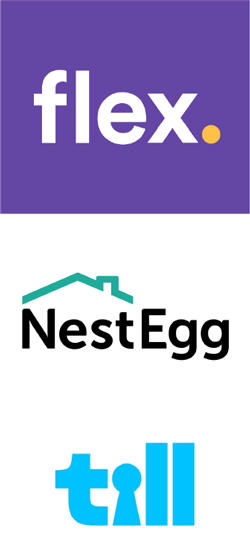As millions of Americans struggle to pay their rent on time, investors are betting on a crop of new startups to help landlords get their money.
Companies like Flex, Till and NestEgg have raised cash to put renters on flexible payment plans. Flex and NestEgg have gone as far as fronting monthly payments to landlords. And San Francisco-based rental marketplace Zumper followed suit this summer when it rolled out a rent guarantee for landlords. The companies make money by charging either the landlord or tenant a fee.
Since March 2020, Zumper has raised $60 million, Till has raised $8 million and NestEgg has raised $7 million from investors keen to address inefficiencies in rent collection, which have been exacerbated by the pandemic.
“Even if your tenants are paying you on time, you’re not getting money until the fifth or sixth of the month,” said Eachan Fletcher, a former Expedia CTO, who co-founded NestEgg in 2017. “That means the first week of each month for landlords is a mini cash-flow crisis.”
NestEgg, which raised its Series A in November 2020, is a lease management tool for landlords that provides a rent guarantee: The startup pays landlords on the first of the month and gives tenants flexible terms to repay their debt. Fletcher said NestEgg pays landlords using a $10 million line of credit; landlords pay $9 per unit per month for the service, and the company doesn’t charge interest or fees to tenants.
But consumer advocates say there are inherent concerns with these models.
Ira Rheingold, executive director of the National Association of Consumer Advocates, called it a red flag when a tenant doesn’t have enough cash to pay full rent when it’s due. “What scares me is you’re sort of renting beyond your means,” he said.
Further, he said renters who choose payment plans should read up on any contracts and terms: “What can the company do if [tenants] don’t make a payment? Are there penalties?”
 Banking on flexibility
Banking on flexibility
Even before Covid, landlords collected millions of dollars in late fees each month. But the economic toll of the pandemic made it harder for millions of renters to make ends meet each month.
In December 2020, rent payments for market-rate apartments fell to its lowest point since April, according to the National Multifamily Housing Council. As of Jan. 5, 76.6 percent of households made full or partial payments. That was up slightly from December but 1.7 percentage points lower than a year ago.
And landlords these days have little recourse when tenants don’t pay. The national eviction moratorium runs through at least the end of January. In New York, Gov. Andrew Cuomo recently extended a ban on evictions until May 1 for tenants who experience a Covid-related hardship.
“The pain points are real,” said Shragie Lichtenstein, founder and CEO of New York City-based Flex, which customizes rent-payment schedules for tenants. Flex, which launched in 2019 and raised a $5 million seed round, ensures landlords get paid on the first of the month by giving renters a line of credit with its bank partner. For $20 a month, tenants get a $2,000 loan to cover their rent.
According to Lichtenstein, the real estate industry has been slow to embrace technology, although that’s beginning to change. The pandemic, he said, has been a catalyst for companies like Flex that claim flexible pay schedules can help maximize a renter’s ability to pay in full.
Lichtenstein said Flex is structured in such a way that it doesn’t allow people to fall into debt. For instance, its bank partner does not approve every applicant.
“If someone has terrible credit, there’s a decent chance they will not be approved,” he said. “It’s not a solution built around $10,000-a-month rent folks. At the end of the day, we’re consumer-first.”
Zumper also has built-in constraints: Its rent guarantee is available in select cities, and the rent cannot exceed 110 percent of the market’s median rent. The tenant also must have a credit score of 650 or higher.
“At its core, we’re trying to help the property owner make sure they get their 12 months of rent,” Vishal Makhijani, Zumper’s president and COO told a San Francisco CBS affiliate in September 2020.
But David Sullivan, CEO of Till, a startup that develops custom payment schedules for renters, said there are downsides of offering credit lines to tenants. The startup used that model, before pivoting in early 2020.
“It’s similar to a payday loan structure,” he said. “It actually doesn’t help the renter.”
Till, which raised $8 million in August, says it is working with 35,000 tenants nationwide. It doesn’t offer a specific rent guarantee, but the company claims 99 percent of tenants on a flexible payment schedule pay on time.
For landlords, that can be a valuable lever to pull.
In September 2020, Asia Capital Real Estate — which owns 8,000 apartments in Florida, Georgia, the Midwest and the Carolinas — rolled out a flexible rent program through Till.
Melanie Gersper, ACRE’s chief operating officer, said working with tenants was the “right thing to do” from an ethical standpoint. But even if eviction were an option, pushing out a tenant makes little financial sense. She’d be left with a vacant unit that could be costly to re-rent, especially during a pandemic.
Working with tenants instead of against them, she said, “is the best path to sustaining and outliving this thing.”
